Diversity


To be black in America is to listen to death daily. To hear mothers wailing at unnecessary funerals, to see fathers mourning lost sons, to offer graveside prayers that puncture the heart of God — this is the sorrow song of a people, and a nation, haunted by racism.
Over our heads however, I hear the sweet, dark sounds of freedom in the air, calling for the dry bones of democracy to arise from the segregated sinews of our society. The multiracial chorus of protestors chanting, "I can't breathe," the die-ins, the walk-outs, and the highway-halting actions of youth from New York to Chicago to Tallahassee to Los Angeles represent a thirst and hunger for righteousness that includes and yet transcends voting.
To join within this symphony of justice, I am calling faith communities to participate in a national #DialInForJustice during the month of December. The goal is to call the Unites States Department of Justice and local police departments, communicating our desire to see systemic reforms to policing in America. This initiative seeks to lift up faith-filled voices alongside the already existing trumpet blasts of groups like the Organization of Black Struggle, Dream Defenders, PICO, Sojourners, and so on.
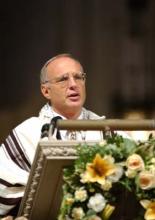
The Senate has confirmed Rabbi David Saperstein as the State Department’s ambassador-at-large for international religious freedom, making him the first non-Christian to hold the job.
Saperstein, who led the Reform Jewish movement’s Washington office for 40 years, focusing on social justice and religious freedom issues, was nominated by President Obama in July and confirmed by a 62-35 vote on Dec. 12.
Saperstein takes a liberal bent on domestic issues, and all but one of the votes against him came from a Republican.
“Religious freedom faces daunting and alarming challenges worldwide,” Saperstein said at his confirmation hearing in September. “If confirmed, I will do everything within my abilities and influence to engage every sector of the State Department and the rest of the U.S. government to integrate religious freedom into our nation’s statecraft and foreign policies.”
Saperstein, named the most influential rabbi in America by Newsweek magazine in 2009, will head the State Department’s Office of International Religious Freedom, where he will be tasked with monitoring religious freedom abuses around the world.

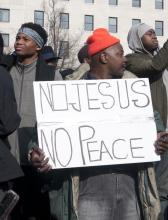
“Excuse my ignorance, I thought I was a free black man.”
“I’m 11 [years old], I matter.”
“You can choose to look away, but never again can you say you didn’t know.”
“How many times do we have to protest the same [s**t]?”
“White silence is white violence.”
“We have nothing to lose but our chains.”
These signs, and many others, lined the horizon of Pennsylvania Avenue on Saturday in Washington, D.C. In a ‘Justice for All’ march organized by Al Sharpton and the National Action Network, thousands of protesters gathered to protest police actions that have resulted in the deaths of unarmed young black men across the United States.
After marching from Freedom Plaza to the U.S. Capitol, protesters listened to speakers from national racial justice organizations address some of these most recent acts of police brutality.
Al Sharpton sought to draw attention to the diversity present on the streets.
“This is not a black march or a white march. This is an American march for American rights,” he said.
Indeed, the black community was not alone in speaking up against police brutality. One Latina activist encouraged her Latino brothers and sisters to “voice their pain” from police harassment and “come forth and unify with the African American community so we can be strong together.”
“¡Ya Basta!” she concluded. [“Enough is enough!”]


Could it be that the crescendo of dissention is divinely synched to yet again heighten disruptive unease among the status quo? Could it be that the promise of Emmanuel — "God is with us" — as proclaimed by the heavenly host, but feared by powerful elite, is unavoidably linked through the eternal truth — such that even the Church universal cannot celebrate one and avoid the other? Could it be that through Advent, we are called to acknowledge the humanity and parity of personhood, rather than rest in the laurels of privilege? The anger of youthful Ferguson protests was marginalized and dubbed as riots, but could it be that this Advent response manifested in expanded multiethnic solidarity is of divine intent to raise challenge to elitism and to demand respect for people of color as equals rather than as patronized subordinates? Could it be that whether or not the media chooses to ignore the connection, the Advent message for those with ears to hear is that perpetrators of brutality, the comfortable protectors of privilege, and the self-serving pundits of power that tried to nullify the everlasting promise were unsuccessful then and now? Could it be by divine design that unknown names, stolen lives, are now divinely lifted to eternal and global recognition as sacrificial symbols so that truth could come to light?

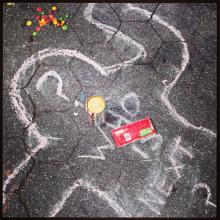
The stories of young black men being killed by white police are sparking a national conversation. However, public responses to these painful stories reveal an alarming racial divide. From an unarmed teenager killed in Ferguson, Mo.; to a 12 year-old boy shot dead in Cleveland; to a white police officer on video choking a black man to death in New York City; and a startling series of similar stories from across the country and over many decades — our reactions show great differences in white and black perspectives.
Many white Americans tend to see this problem as unfortunate incidents based on individual circumstances. Black Americans see a system in which their black lives matter less than white lives. That is a fundamental difference of experience between white and black Americans, between black and white parents, even between white and black Christians. The question is: Are we white people going to listen or not?
White Americans talk about how hard and dangerous police work is — that most cops are good and are to be trusted. Black Americans agree that police work is dangerously hard, but also have experienced systemic police abuse of their families. All black people, especially black men, have their own stories. Since there are so many stories, are these really just isolated incidents? We literally have two criminal justice systems in America — one for whites and one for blacks.
Are there police uses of force that are understandable and justifiable? Of course there are. If our society wasn’t steeped in a gun culture, many of these shootings could be avoided. But has excessive, unnecessary, lethal force been used over and over again, all across the country, with white police killing unarmed black civilians? Yes it has, and the evidence is overwhelming. But will we white people listen to it?

At the point of the writing of this article, it has been 124 days since unarmed 18-year-old Michael Brown was shot six times and killed by Ferguson police officer Darren Wilson.
Blocks from the spot where Brown lay dead in the tightknit Canfield neighborhood of Ferguson, Mo., protestors filled West Florissant Avenue, where Brown had been only minutes before his death. They were met by the local police force decked out in camouflage and body armor, armed to the gills with military-grade weapons, and rolling around in armored cars. Many commented that the streets of Ferguson looked like Fallujah.
It was both shocking and clarifying at once.
For the first time, Americans witnessed real-time outcomes of the National Defense Authorization Act, which funnels military weapons left over from past wars to local police municipalities across the country — in theory, to fortify local efforts in America’s drug war. Cable news cameras swarmed as wartime weapons, tactics, and protocols were enacted on unarmed, mostly black citizens exercising their First Amendment rights to assemble and exercise free speech.
Here’s the thing about war: There are only enemies and allies. There is no in-between.
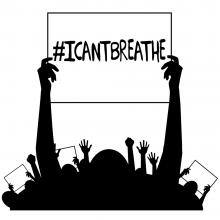
Our nation stands at a crossroads moment as the simmering crisis around policing and our justice system reaches a boiling point. Recent cases of police violence in Ferguson, Cleveland, and now Staten Island have stirred an awakening around what is increasingly understood as a pervasive and pernicious problem in America in which black lives are too often treated differently when it comes to police accountability and criminal justice.
Last week, I had the privilege of participating in a retreat with other faith leaders convened by Sojourners to learn about and make common cause with the ongoing efforts to seek justice in the tragic death of Michael Brown Jr. We spent a day talking to local faith leaders and young activists. We visited the memorial site in Ferguson where Brown was tragically killed and the streets where 120-plus days of protest have ensued. While it was heart-wrenching to stand and pray at the site where Brown was killed, I left the two days filled with a resilient sense of hope based on our conversations and interactions with a cross section of young people, most in their early to mid-20s, who embody modern-day freedom fighters. I hope we as a nation can listen to their voices and come to know their stories as we seek answers around what our response should be.
Young activists at the center of the protest movement in Ferguson are refusing to accept cosmetic change or symbolic commitments; instead they are fighting to transform their community and our nation so that neither punishment nor privilege will be systemically or viciously tied to the color of our skin. In the process, these young activists are picking up the broken pieces of the civil rights struggle. Their courage, willingness to sacrifice, and bold vision gave me a great deal of hope for what America can be.
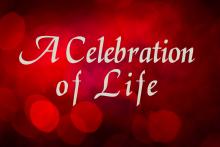
For the past several years, I have been less outwardly celebratory during the Christmas season. No wreaths, trees, or bad sweaters for me; I have chosen to be introspective during the end of the year season in order to keep my focus on the true meaning of Christmas. This has become increasingly difficult, as the process of commercializing the celebration of Christ’s birth begins right after Halloween and extends itself until after the nation celebrates the life of Dr. King in January. This year, it has been increasingly difficult to concentrate on this Season of Advent in light of all of the anger and protests going on around the country. The protests over grand jury decisions in both the Michael Brown (Missouri) and Eric Garner (New York) cases and the heartbreak and anger over the deaths of Tamir Rice (Ohio) and Akai Gurley (also in New York) have served for me as a reminder that we need to rally around life.
Many of those critical of the decisions in these cases say that black lives do not matter, and there is some validity to that in a nation that has never truly been delivered and healed from the effects of chattel slavery. Those on the other side say that these cases have gone to the judicial system and that the system should be respected, the issue dropped, and that personal responsibility is the mindset that will move the nation forward. While there is truth in both of those opinions, I am led to think of the joy the families of these dead men and boys must have felt at their birth – a moment of endless possibilities – and I also think of the finality – the end of chances represented by their deaths.

My friend Peter Heltzel, along with a cohort of some 75 faith leaders in New York, have called the lack of police accountability in New York and elsewhere “a spiritual problem.” They’re right, and it’s a problem that requires a spiritual response.
But beyond all of this, there is a greater spiritual sickness I see — one that is not being discussed nearly enough. It reaches both to the deeply individual level and to a global scale. It is the question that Dr. King asked, and ultimately died for — as well as others, past and future. It was a principle for which Jesus was willing to die as well. And yet the wound festers.
Violence, or the threat of violence, is real. And the human response of fear to such a threat is a normal, socially-accepted response. It is a deeply rooted instinct, honed by human evolution over millennia, to defend ourselves against a perceived threat. However, if we want the systems around us to change, we have to consider that the fear-and-violence response has failed us, time and again. Despite using it, we still have both fear and violence. And those with power exploit those fears to further personal agendas and to manipulate others.
We hold out hope that changing leadership at local, state, and federal levels ultimately will save us from ourselves. But as Walter Wink wisely said, "If you want systems to really change, you can’t just change the rulers; you have to change the rules entirely."
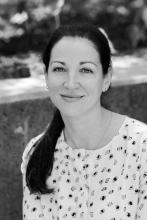
Beth Latz is founder and executive director of Project Interfaith, projectinterfaith.org
1. Why did you decide to launch Project Interfaith?
There are a couple experiences in my life that led me to found PI. One would be that my grandparents immigrated to this country after experiencing harsh persecution as a result of their Jewish identity. Another would be growing up as a religious and ethnic minority and encountering a lot of people making assumptions about what that means. I didn’t always feel welcome or free to be who I am. But growing up and hearing about my grandparents’ experiences in other countries, I realized how lucky we are to have certain rights in this country. So I wanted to make sure people understand these rights and freedoms.
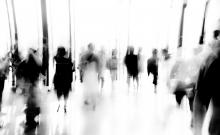
2014 WAS NOTHING if not the year when implicit bias was exposed in law enforcement, the justice system, and media reporting. As the nation sorted out reporting on the police shooting of 18-year-old Michael Brown in Ferguson, Mo., police treatment of protesters, and the accuracy of the reporting itself, the words “implicit bias” or “unconscious bias” jumped to the fore again and again.
According to the Kirwan Institute report “State of the Science: Implicit Bias Review 2014,” “Implicit bias refers to the attitudes or stereotypes that affect our understanding, actions, and decisions in an unconscious manner.”
My question is this: If 2014 opened the eyes of the general public to the presence of implicit biases embedded in our systems, could 2015 be the year when we begin to take a closer look at the impacts of implicit bias in our public systems and structures—and the way we talk about them?
For example, take this tit-for-tat about the education system: On Oct. 11, in his third column in a series called “When Whites Just Don’t Get It,” Nick Kristof wrote in The New York Times, “Too many whites unquestioningly accept a system that disproportionately punishes blacks and that gives public schools serving disadvantaged children many fewer resources than those serving affluent children. We are not racists, but we accept a system that acts in racist ways.”

Jordyn Garrett left home so he could become Olivia. Lerato “Lee” Mokobe left South Africa to pursue her dreams, but can’t return because of the dangers her home life and culture posed to her identity. Sarah Silva left her home because of sexual abuse and unhealthy family relationships.
They’re not even old enough to rent a car, and yet they’re living homeless in New York City. But these and other young adults found themselves a family in the Reciprocity Foundation.
The Reciprocity Foundation is a nonprofit dedicated to helping the city’s homeless youth realize their full potential by developing their passions and reconnecting with their spiritual side. Many of the youth they work with are people of color or part of the LGBT community, and many come from religious backgrounds.
“Many (of these youth) feel negatively towards religion since it has contributed to their isolation from their family and/or homelessness,” said Taz Tagore, a Reciprocity co-founder.

Imagination is defined as, "The faculty of imagining or of forming mental images or concepts of what is not actually present to the senses."
For privileged Christians who have lived the majority of their lives receiving the benefits of systematic wealth, power, comfort, favor, and convenience, it can be almost impossible to conceive of a world where injustice, inequality, and perpetual oppression are daily struggles.
Many privileged believers experience an entire existence completely devoid of the suffering, trials, and endless forms of racism, stereotyping, and injustice that are the daily realities faced by the likes of Trayvon Martin, Michael Brown, Eric Garner, and millions of others who have lived under completely different — and radically unfavorable — circumstances.
Thus when parties from both sides try to communicate with one another, it is extremely difficult, frustrating, and nearly impossible to even begin to comprehend each other’s worlds — unless you utilize the spiritual discipline of imagination.
In the Bible, Jesus is constantly challenging the status quo and striving for justice, peace, and reconciliation against cultural factors and precedents that seem impossible to overcome. For the human vessels that God calls upon, they are required to imagine the inconceivable, accept the unthinkable, and break out of their stubborn paradigms in order to embrace the Divine.

